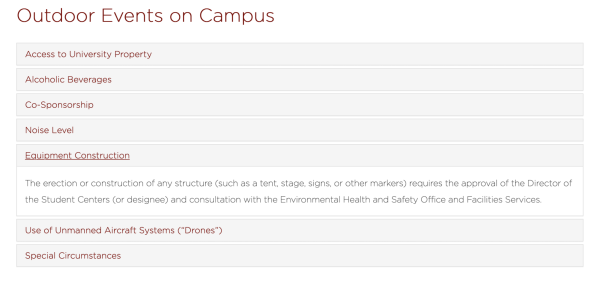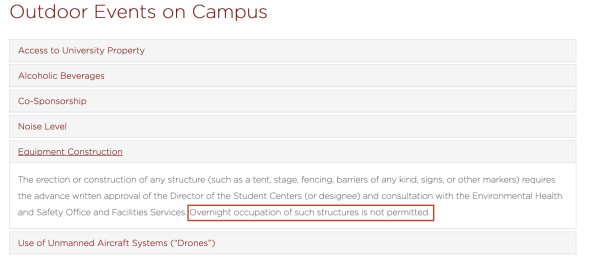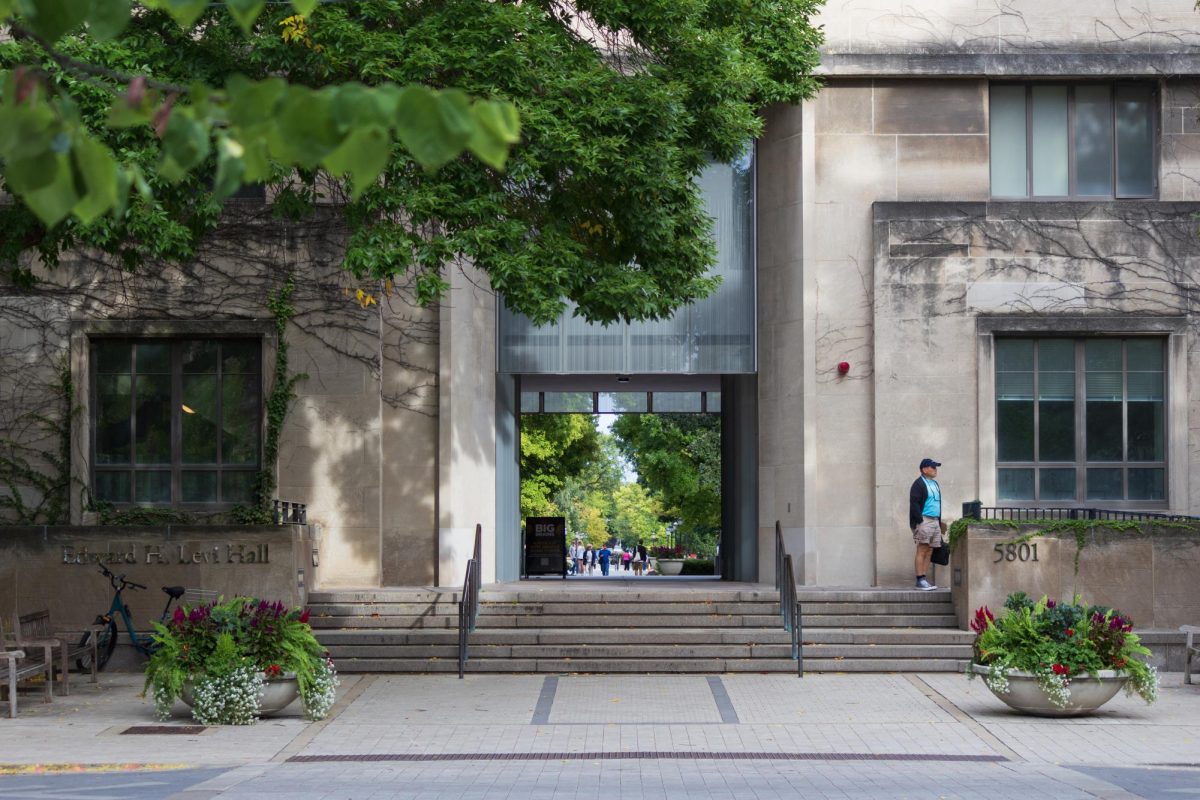In an email sent to students on September 24, Interim Dean of Students in the University Michael Hayes informed the University community that, heading into the 2024-25 academic year, the University has updated several of its policies regulating protests on campus.
“The University regularly evaluates and revises policies and regulations to address the evolving needs of our community. This year’s changes include updates that clarify existing policies and help foster a diversity of voices across our student body, in alignment with our free expression principles,” Hayes wrote in the email.
The changes include an explicit ban on “staying overnight in outdoor structures on campus or in non-residential campus buildings,” a clarification that “the erection or construction of any structure on campus” requires advance approval from the Director of Student Centers, and that amplified sounds are only permitted on campus at certain times and “not inside campus buildings.”
Versions of the student manual captured by the Internet Archive’s Wayback Machine show that, as of July 14, the manual did not explicitly prohibit overnight occupation of approved structures on campus.


The revised policies also include guidance for counterprotesters, changes to how and where signs and flyers can be posted on campus, and new locations for tabling, hanging banners, and temporary quad reservations.
Counterprotesters are instructed to not “engage in actions that deprive others from participating in an activity or event,” “impinge on space reserved by others,” or “interfere with signs, installations, or other materials associated with an activity.”
The posting of signs on “windows, doors, building columns, structural supports, woodwork, flag poles, light poles, or fencing” is now prohibited, as is the use of “glue, packing/shipping tape, and stickers” to post signs. Earlier versions of the policy only referred to unspecified “designated areas” as being approved for posting signs, and stickers were not prohibited. The new policy also includes an update to how “out-of-policy” postings can be reported.
“The University policies and regulations on these subjects are intended to support free expression while restricting individuals from using violence, threats, or harassment while expressing their opinions. University policies do not allow interfering with or obstructing the freedom of others to express different or opposing views. Disruptive conduct that is incompatible with the functioning of the University, and as described in University Statute 21, could result in disciplinary action,” Hayes continued.
A September 23 email from University President Paul Alivisatos welcoming the University community back for Autumn Quarter shared a similar message.
“While constructive dialogue is the gold standard to strive toward, speech should never be chilled. Actions that chill the speech or learning of others are out of bounds, and the University’s academic and administrative leadership is obliged to act to protect the community from such actions,” Alivisatos wrote. “Such chilling actions can include disrupting the speech or expression of others, disrupting the ability of classes and events to proceed, and other efforts intended to impose rather than propose a viewpoint for others. Acts of discrimination and harassment are inimical to our values and purposes, and we will defend our community against such actions.”
The full list of revised policies can be found on the new Free Expression Resources page or in the Student Manual.
According to a report from Mother Jones, a San Francisco-based newsroom produced by the Center for Investigative Reporting, revisions of protest policies on college campuses across the United States are becoming more common. The report found that since May, “over 30 colleges and university systems—representing nearly one hundred campuses” have revised their protest policies.
In a statement to the Maroon, the University expanded on its rationale for updating protest policies and how it sees them fitting within the University’s commitment to free expression.
“The University regularly evaluates and revises policies and regulations to address the evolving needs of our community. This year’s changes are intended to encourage a diversity of voices across our student body while clarifying our policies on disruptive conduct that is incompatible with the functioning of the University,” the statement read. “The University’s commitment to free expression and the right to protest are unchanged. The policy changes are designed to clarify policies that were already in place, such as the conditions under which amplified sound is permitted.”
“To provide more streamlined reporting options, the University has developed forms for reporting disruptive conduct concerns and concerns about postings, in addition to the form to report harassment, discrimination, or sexual misconduct. Deans-on Call will continue to be the primary resource and point of contact for students participating in protests,” the statement concluded.










Matthew G. Andersson, '96, Booth MBA / Oct 2, 2024 at 8:16 pm
By all means, students should get permission to protest. What is fascinating about this kind of university corporate assertion, of course, is that it is irrelevant to protesting, and as a lesson or teaching act, violates learning theory. A protest is, by definition, and by necessity as a behavior of defiance, an act of rejection. Protest does not function by permission, by a permit or through pre-approval. Like free speech, it is not free, and comes with a price. Either protestors are willing to pay that price in defiance, and by defiance, form their speech-act, or someone else is in control of the behavior, which makes it thereby inauthentic and ineffective. Protesting, whether merely a peaceful assembly, or a more active mix of speech and actions, must inherently “break” rules, and pragmatically break the law, where law is only a rule established by corporate institutionalism. Protesting stems from other, arguably superior laws. University administration is organized for reward and punishment, as it protects, and is usually an agent of, the sources and causes that make protest ultimately necessary, including war profiteering, weapon commercialization (including biologic), and institutionalized ethno-religious and political hegemony. This makes it precisely the correct forum for protesting, and structurally violating its rules. Like the incoherent, opportunistic “Forum for Free Expression” run by Law’s professor Ginsburg, the university corporation seeks to appropriate and monetize student natural freedoms, by turning them into faculty and administrative privilege. Student protests usually are addressing profound social failure such as war or genocide. Those are not fought by permits and permissions, or can be subject to the career interests of faculty. Faculty, administration and governance are relevant to protesting, only as its object. Readers may wish to see “The University of Chicago Isn’t Living Up to Its Principles,” at the James G. Martin Center for Academic Renewal.
James Cameron / Oct 6, 2024 at 6:28 pm
Matthew Andersson is an imbecile.
Can’t believe he got past the Booth Admission Staff.
For those who have read his “ideas” over the years, its clear he’s out of his depth in a puddle.
Dave Gaballa / Oct 7, 2024 at 3:55 pm
Andersson doesn’t worship woke toddlers like yourself. Ergo, he is an imbecile!
Close your mouth. No one cares what you have to say. Wokenites add no value to this institution or the world at-large. Parasite.